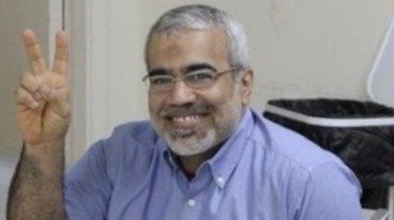27 international human rights organizations on January 17 sent an open letter to the United States government and other Western powers urging them to put pressure on Bahrain to release prominent activist-academic Dr. Abduljalil al-Singace, currently serving a life sentence in prison. The well-known pro-democracy activist, academic, blogger, and leader of the persecuted Shia minority in Bahrain, Al-Singace has been on hunger strike for the last 194 days to demand that the research carried out by him in the last four years while in prison be handed over to his family.
Al-Singace was arrested and sentenced to life in prison in 2011 along with 13 other pro-democracy activists after being convicted on charges including “setting up terror groups to topple the regime.” Prison authorities confiscated his research in April last year and have refused to return it to him or his family.
In the letter, the international organizations called for the “immediate and unconditional release of respected Bahraini academic, blogger, and human rights defender, Dr. Abduljalil Al-Singace, who is serving a life sentence for his peaceful role in Bahrain’s 2011 uprising. He turned 60 on 15 January, 2022 and has been in prison for over a decade in violation of his rights to freedom of expression and assembly. We are further concerned that Dr. Al-Singace has been on hunger strike for over 190 days since 8 July, 2021 to protest the confiscation of his academic research on Bahraini culture. In addition to the health consequences of not eating solid food for nearly six months, Dr. Al-Singace also suffers from chronic medical conditions, including post-polio syndrome, requiring crutches or a wheelchair since birth.”
The letter also expressed concern for other political prisoners in Bahrain. These include Danish-Bahraini activist Abdulhadi Al-Khawaja, Swedish-Bahraini activist Sheikh Mohamed Habib Al-Muqdad, secretary-general of the dissolved Al-Wefaq National Islamic Society (Al-Wefaq), Sheikh Ali Salman, and human rights defenders Naji Fatee, Abdulwahab Husain, Hasan Mushaima and Ali Al-Hajee.
The letter noted the shocking details documented by the government-commissioned Bahrain Independent Commission of Inquiry (BICI) which revealed the wide extent of abuse faced by prisoners, including physical and psychological torture and military trials. The letter states that the report documented Dr. Al-Singace being subjected to nightly beatings for two months in solitary confinement. It claimed that the authorities targeted his disability by confiscating his crutches, making him “stand on one leg for prolonged periods,” and pushing his crutch “into his genitals.” The authorities also “threatened him with rape and made sexually explicit comments about his wife and his daughter.”
Amnesty International, Bahrain Center for Human Rights, Committee to Protect Journalists (CPJ), Democracy for the Arab World Now (DAWN), Human Rights First, Gulf Center for Human Rights, Bahrain Institute for Rights and Democracy (BIRD), Project on Middle East Democracy (POMED), and IFEX are among the signatories to the letter.
In addition to academics, trade unions, and rights groups, the UN, EU parliament, UK parliament and the US House of Representatives have also called for Al-Singace’s release.
Bahrain witnessed a popular uprising in 2011 with citizens demanding more democracy and rights for the persecuted Shia minority. The regime cracked down on the protesters and targeted opposition figures, dissidents and critics with thousands being arrested and many others killed. Opposition political parties and several independent news outlets were banned from functioning in the country. Many human rights and pro-democracy activists faced state persecution including malicious charges for serious crimes against the state and national security, judicial action, and custodial torture. Human rights groups have condemned the trials against activists as unfair and arbitrary. Several activists were convicted without evidence and sentenced to life imprisonment or death.
Even as Bahrain continues to repress its own citizens, its major Western allies are yet to take any concrete action, aside from routine statements on human rights, due to extensive trade ties with the country, particularly in weapons sales.





